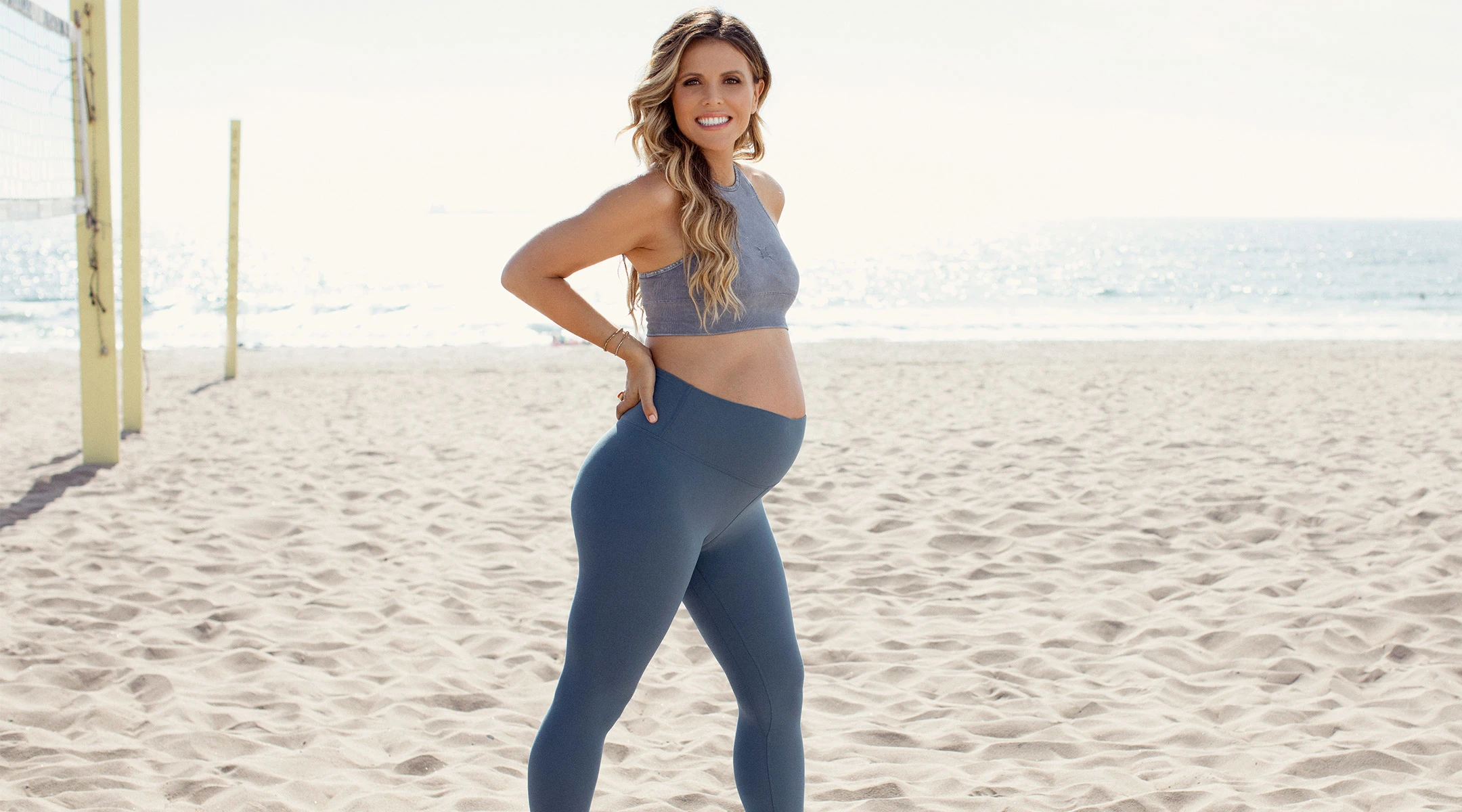Awesome Pregnancy Workouts for Every Trimester
Fitness expert Katrina Scott knows a thing or two about working out while pregnant. The co-founder of Tone It Up, the mega-popular fitness brand, recently became a new mom herself—and she’s sharing pregnancy-safe exercises you can do in each trimester to stay strong and healthy. As always, if you have any specific questions or concerns, make sure to chat with your doctor and get the green light before getting started.
When it comes to working out while pregnant, especially early on, time and energy are two of the biggest challenges. This first trimester workout is perfect to fit in a quick, energizing strength routine that’ll tone you up from head to toe. Do the following circuit two to three times, resting for 60 seconds (or as long as you need) between circuits.
Squat and Press
Sculpts your legs, butt and shoulders.
Stand with feet hip-width apart, holding a dumbbell in each hand at shoulder height. Keeping your chest up and core engaged, lower into a squat position, keeping your booty back and thighs as close to parallel to the ground as possible. Driving though your heels, come back up to standing as you press the dumbbells overhead. Do 15 reps.
Reverse Lunge and Curl
Tones your legs, butt and biceps.
For this first trimester exercise, begin standing with feet together, holding a dumbbell in each hand at your sides. Engaging your core, step your right foot back and lower until your legs are bent at 90 degrees and your back knee is hovering just above the ground. At the same time, curl the dumbbells up to your chest. Come back up to standing by stepping the right foot forward and lowering the dumbbells back down. Repeat on the other side. Do 12 reps on each side.
Single Arm Row and Tricep Kickback
Sculpts your back and triceps.
Begin with your left foot in front of the right, left knee slightly bent and left hand resting on your left thigh. Hold a dumbbell in your right hand, arm extended toward the ground. Row the dumbbell up to chest height, keeping your elbow tucked closely to your side, then extend your arm straight behind you. Reverse the motion back to start position. Do 12 reps on each side.
Bird Dog
Tones your butt, arms and core.
Start this first trimester workout on your hands and knees with a flat back and core engaged. Extend your right leg straight behind you as you extend your left arm in front of you. Return to start position and repeat on the other side. Do 12 reps on each side.
Side Plank Crunch
Sculpts your obliques and shoulders.
Start in a modified side plank position propped up on your left hand with your left (bottom) knee on the ground and right (top) leg extended out straight. Reach your right arm directly overhead. Bring your right elbow to meet your right knee as you engage your obliques. Return to start position and repeat. Do 12 reps on each side.
This second trimester workout routine focuses on strengthening your postural muscles so you stay strong, properly aligned and pain-free throughout your pregnancy. After all, you’ve got to support that growing bump! Do the following circuit two to three times for an amazing arm workout that tones your biceps, triceps, shoulders and postural muscles. Rest for 60 seconds between circuits. And don’t forget to hydrate!
Curl and Press
Sculpts your biceps and shoulders.
Stand feet hip-width apart, holding a dumbbell in each hand at your sides. Keeping your chest tall and core engaged, curl the dumbbells up to shoulder height, then press them overhead. Reverse the motion and repeat. Do 15 reps.
Bent Over Fly
Sculpts your shoulders and back.
Begin this second trimester exercise by standing with your knees bent, holding a dumbbell in each hand, palms facing each other. Hinge forward at the waist, keeping a flat back. Raise both arms to the sides, maintaining a slight bend in the elbows as you squeeze your shoulder blades together. With control, lower the dumbbells back to start position. Do 15 reps.
Single Arm Row
Tones your back and arms.
Begin with your left foot in front of the right, left knee slightly bent and left hand resting on your left thigh. Hold a dumbbell in your right hand, arm extended toward the ground. Row the dumbbell up to chest height, keeping your elbow tucked closely to your side, then return to start position. Do 15 reps on each side.
Alternating Forward Raise
Tones your shoulders and arms.
For this second trimester workout, begin standing tall, holding a dumbbell in each hand and palms resting against the front of your thighs. Raise your right arm straight in front of you to shoulder height, then return to start position. Repeat on the left side. Do 15 reps on each side.
Tricep Push-Up
Sculpts your triceps and chest.
Come down to your hands and knees and position your hands slightly closer than shoulder-width apart. With arms straight (elbows not locked), lower your hips until your body forms a straight line from head to knees. Keeping your elbows tucked close to your body, lower yourself as close to the ground as possible (bump permitting), then press back up. Do 12 reps.
A strong butt and legs are everything during your third trimester (not to mention delivery and beyond!). The best thing about booty workouts? You can do them throughout your whole pregnancy! Repeat the following circuit two to three times through, resting for 60 seconds (or as long as you need) between circuits. And of course, remember to hydrate.
Plié Squat and Pulse
Sculpts your entire lower body.
For this third trimester workout, stand with feet wider than hip-width apart, toes pointed out, holding a dumbbell in both hands and arms extended down in front of you. With chest tall and core engaged, lower straight down until your thighs are as close to parallel to the ground as possible. Pulse one inch up, then one inch down, and drive through your heels to come back up to standing. Do 15 reps.
Single-Leg Deadlift
Sculpts your butt, legs and core.
Stand with feet together, holding a dumbbell in each hand in front of your hips. Shift your weight to your left foot, knee softly bent. (Use your right foot as a kickstand if needed for extra balance). With a flat back, hinge at the hips and lower your torso to the ground, reaching the dumbbells toward your standing foot as your right leg extends straight behind you. Engaging your butt and core, drive through your standing heel to come up to standing. Do 12 reps on each side.
Side Lunge
Sculpts your butt and legs.
Begin this third trimester exercise by standing with feet together (or hip-width apart for extra balance), toes pointed forward and holding a dumbbell in each hand at your sides. Take a big step to your right with your right foot as you sit back in your hips and extend your left leg straight. Come back up to standing, engaging your butt and core. Do 12 reps on each side.
Tabletop Booty Lift
Sculpts your butt and core.
Start on your hands and knees and extend your right leg straight behind you, toe resting lightly on the ground. With your back flat and core engaged, lift your right leg up to hip height, then lower. Do 15 reps on each side.
Side Plank and Leg Lift
Sculpts your butt, thighs and obliques.
Start this third pregnancy workout in a modified side plank position propped up on your left hand with your left (bottom) knee on the ground and right (top) leg extended out straight. Rest your right hand on your right hip. Lift your right leg to hip height as you engage your obliques. Return to start position and repeat. Do 12 reps on each side.
For more pregnancy workouts—including strength training, total-body sculpting and more—download the Studio Tone It Up app. Head over to the app’s Pregnancy On Demand channel to find tons of amazing pregnancy exercise routines just for you.
Katrina Scott holds a Bachelor’s degree in Health Promotion and Fitness and is certified as a Master Trainer and Group Fitness Instructor. She started Tone It Up with co-founder Karena Dawn in 2009, a fitness brand that has grown to offer workout routines through its app and website, as well as nutrition plans, apparel and more. She welcomed her first child in October 2018. Follow her on Instagram @katrinaascott.
Published October 2018
Please note: The Bump and the materials and information it contains are not intended to, and do not constitute, medical or other health advice or diagnosis and should not be used as such. You should always consult with a qualified physician or health professional about your specific circumstances.
Plus, more from The Bump:
Navigate forward to interact with the calendar and select a date. Press the question mark key to get the keyboard shortcuts for changing dates.



































































